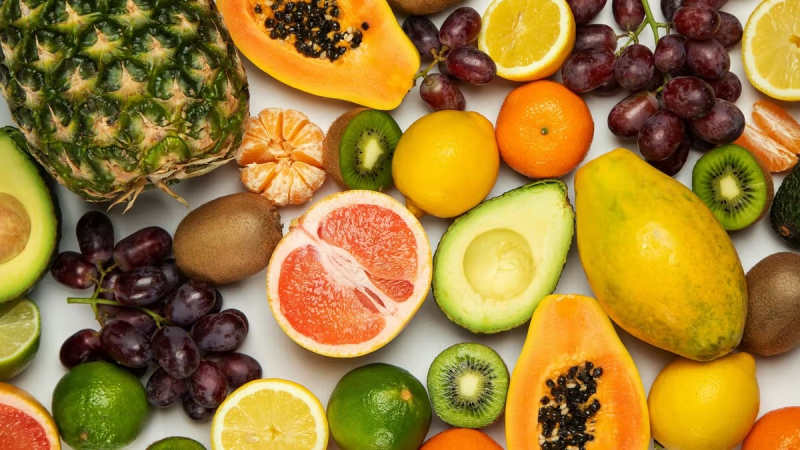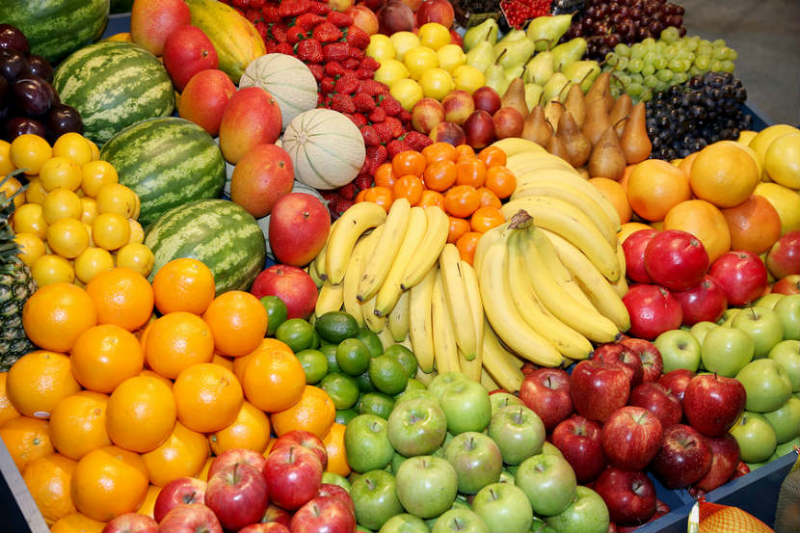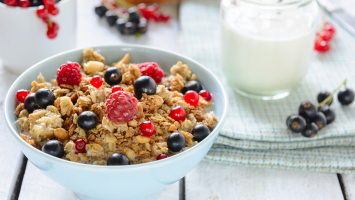Top 10 Best Healthy Eating Habits
When concentrating on overall well-being, people can achieve by following good eating habits. Below are some of the easy-to-implement healthy eating ... read more...suggestions from dietitians are supported by research.
-
Many drinks that on the surface look healthy, such as fruit punch and sports drinks, actually contain added sugars. Unfortunately, consuming too much added sugar has been associated with harmful effects like obesity, cardiovascular disease, type 2 diabetes, nonalcoholic fatty liver disease, and metabolic syndrome.
According to the Dietary Guidelines for Americans, people should keep their added sugar consumption to less than 10% of their overall calorie intake. That amounts to around 12 tablespoons of sweet stuff for a 2,000-calorie diet. However, American people consume roughly 17 teaspoons of added sugar on average each day, significantly above the recommended amount. Your body can get the hydration it needs without any added sugars by substituting sugar-free choices like water, seltzer water, unsweetened coffee or tea, and even 100% fruit juice in moderation for drinks with added sugars, such as regular soda, sweet tea, sports drinks, fruit punch, lemonade, and fruit "drinks."

Skip drinks with added sugars 
Skip drinks with added sugars -
Fermentation is a process in which bacteria and yeast break down sugars. In addition to tasting delicious, fermented foods like kimchi and sauerkraut also provide the body with live probiotics that benefit the health in many ways.
Eating fermented foods increase the probiotics, or good bacteria, in your gut. Probiotics are linked to a number of health benefits, including greater immunity, better digestion, and even faster weight reduction. Start your day with plain yogurt to give your body a probiotic boost, have miso soup for dinner, or sip kombucha in the middle of the day for some fermented goodness.

Include fermented food in your diet 
Include fermented food in your diet -
DHA omega-3 fatty acids, selenium, vitamin B12, and a variety of other vital minerals that maintain human health are abundant in fish, especially oily fish like salmon.
People who consume fish seem to live an extra 2.2 years on average than those who don't. Eating fish has been related to a number of additional potential health benefits, such as a decreased risk of type 2 diabetes and cardiovascular disease. Most of the heart benefits of eating fish are likely due to the omega-3 fatty acids, which are abundant in many types of seafood. Omega-3s are crucial for cell-to-cell signaling in heart muscle and for cells within the lining of the arteries. They help in lowering cholesterol, reducing inflammation, preventing irregular cardiac rhythms, and improving artery flexibility. The Dietary Guidelines for Americans suggest that most Americans should eat at least 8 ounces of fish every week.

Eat 2 to 3 servings of low-mercury non-fried fish every week 
Eat 2 to 3 servings of low-mercury non-fried fish every week -
Highly processed meats like bacon, sausage, and lunch meats are undoubtedly handy and delicious. However, these meat options can also be high in nitrates, a substance that, when cooked, can produce compounds that may cause cancer. Many of these meat options are also very salty. Studies have revealed links between processed meat and numerous cancers, heart disease, and diabetes.
In comparison to unprocessed meat, processed beef offers a little bit more fat, calories, and protein per serving, but less cholesterol. Salt (processed meat contains four times as much salt as unprocessed meat) and non-salt preservatives (higher in processed meat) are the main nutritional differences between unprocessed and processed red meat. Fresh cuts of meat, such as those turkey, chicken, and beef, can provide a tasty meat alternative that is lower in salt and nitrate-free.

Swap out highly processed meat for fresher options 
Swap out highly processed meat for fresher options -
Milk is not only for children. A glass of milk is a staple food that goes great with chocolate chip cookies and is packed with 13 essential minerals, including calcium, protein, and magnesium, which help strengthen bones. Even though milk is packed with nutrients, only 20% of adults regularly consume even one glass of this beverage.
It's quite OK to drink a regular glass of milk every day if you are not lactose intolerant or allergic to dairy. Drinking milk and using other dairy products in your diet can have certain health benefits, from enhancing bone health to preventing cognitive decline. Milk is a good source of calcium, protein and vitamin B12, all of which are critical nutrients for older adults.

Have a glass of milk every day 
Have a glass of milk every day -
Fruits are a good source of fiber, vitamins, and minerals, as well as other essential components for the body. According to some sources, eating fruit in the afternoon might have more positive effects on your health than eating it in the morning. It is believed that having a high-sugar snack in the afternoon will increase blood sugar levels and "wake up" the digestive system.
Instead of grabbing sweet snacks or caffeinated beverages when 3 p.m, eating fruit as part of a balanced snack can provide you with sustained energy as well as certain nutrients that boost your energy levels. Giving your snack some staying power by including a serving of fruit and protein will help you feel full and prevent a possible sugar crash right after eating.

Add fruit to your midday snack 
Add fruit to your midday snack -
One of the best sources of fiber, a vitamin that helps maintain gut health and possibly lower your risk of getting some cancers, is vegetables. In addition, a lot of vegetables are low in calories and can provide a bit more satisfying and flavorful for dishes.
It's not necessary to eat only salad every day of the week if you add veggies to your recipes. You may easily add more broccoli to your stir-fry or spinach to your homemade soup to give your food a healthy boost. A great way to get a variety of key vitamins, minerals, and other nutrients needed for health is by eating a wide variety of colorful vegetables. Try to include any of these vibrant veggies in your next meal: beans, bok choy, Brussels sprouts, pumpkin, peas, lentils, broccoli, capsicum, and lentils. A variety of nutrients found in vegetables help to maintain well-being and health and lower the risk of chronic diseases including heart disease and some cancers.

Add more vegetables to your dishes 
Add more vegetables to your dishes -
Eating while watching TV is harmful for your health. According to experts, multitasking activities like eating while working or watching television might cause you to eat more. You don't realize how much or what you are eating because your mind is occupied. Additionally, if you eat while watching TV, you might not be aware of your hunger levels.
According to several studies, eating while watching TV can raise the risk of obesity, particularly in children. Long periods of time spent watching TV can lower your metabolic rate or reduce your body's ability to burn calories. This might result in fat building up around your waist, raising your risk of obesity. Therefore, eat your meals first before watching TV. When you eat while watching TV, your attention is still on the show. As a result, it prevents you from feeling satisfied, which causes you to feel hungry even after eating a lot.

Don't eat in front of the TV 
Don't eat in front of the TV -
Convenient foods that are simple to incorporate into a healthy diet are canned foods like tuna, tomatoes, and beans. However, you might not be eating as well as you think if the cans that your food is kept in contain BPA, a substance that aids in preventing metal corrosion.
Some studies have linked greater BPA levels to an increased risk of type 2 diabetes, obesity, high blood pressure, and other negative outcomes. Foods in plastic containers or with plastic linings should be avoided (particularly those with a recycling code of 7). Choosing goods with glass or stainless steel containers is the best way to stay away from BPA. Additionally, stay away from paperboard food containers, which are often seen in fast-food establishments because they are lined with plastic.

Choose BPA-free canned foods 
Choose BPA-free canned foods -
You can control how much you actually eat if you plan your own meals. Meal planning can encourage people to eat a healthy diet and may even prevent obesity. You can navigate your healthy eating with ease if you take the time to prepare your meals for the whole week.
You are more likely to eat anything you can get fast when you are hungry and your blood sugar is dropping. This is the reason why many people choose the nearby fast food restaurant's unhealthy menu. When you have a balanced meal on hand that is prepared and ready to go, full of nutrient-dense food, meal planning avoids this issue. Make a plan for your meals for the entire week by making a meal plan. Create a shopping list for yourself and prepare the ingredients for all of the week's quick meals.

Plan your meals 
Plan your meals































